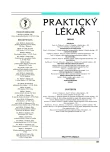-
Medical journals
- Career
Molecular methods in cytogenetic investigations in clinical oncology
Authors: A. Vícha; T. Eckschlager
Authors‘ workplace: 2. LF UK a FN Motol, Praha přednosta prof. MUDr. J. Starý, DrSc. ; Klinika dětské hematologie a onkologie
Published in: Prakt. Lék. 2005; 85(7): 387-390
Category: Various Specialization
Overview
Chromosomal aberrations affecting the tumor cell are frequently specific for a certain type of tumor. The demonstration of them is applied in clinical practice to confirm the diagnosis, in an atypical histological finding, unusual clinical course, or for prognostic histological finding, unusual clinical course, or for prognostic estimates. They are detected by examining the caryotype, by fluorescence in situ hybridization (FISH) or by its variants – multicolor FISH (mFISH), spectral caryotyping (SKY), or comparative genomic hybridization (CGH). Examples are the verification of a peripheral primitive neuroectodermal kidney tumor by the demonstration of a translocation, t(11;22), specific for the tumor, and the specification of the diagnosis of a germinal tumor of the mediastinum with malignant transformation into a rhabdomyosarcoma by the demonstration of amplified 12p genetic material. Demonstration of the Philadelphia chromosome, t(9;22), is important in the diagnostics of chronic myeloid leucemia. Cytogenetic investigation is also essential in the classification of the myelodysplastic syndrome (MDS) in as certain forms of that disease are defined on the basis of chromosomal aberrations. Prognosis in certain tumors is connected with the presence of specific chromosomal aberrations. Another important indication is the search for signs that allow the demonstration of a minimal tumor disease. Molecular cytogenetics methods represent established diagnostic procedures having a wide spectrum of applications in clinical oncology. Such investigations have become a component of a number of diagnostic and therapeutic protocols, and that should be kept in mind in the examination of a patient suspect of a malignancy. Last but not least, at present there is being introduced into practice antitumor therapy focused against specific cellular molecules demonstrated namely by molecular cytogenetic investigation.
Key words:
malignant tumors – chromosomal aberrations – caryotype – fluorescence in situ hybridization – comparative genomic hybridization.
Labels
General practitioner for children and adolescents General practitioner for adults
Article was published inGeneral Practitioner

2005 Issue 7-
All articles in this issue
- Q fever – clinical picture
- Q fever: properties of the agent
- Molecular methods in cytogenetic investigations in clinical oncology
- How willing are patients to comply with regimen measures?
- Delirium treated at a gerontopsychiatric ward for acute cases
- Horner’s syndrom: Topical diagnostics of the causative lesion (three case reports)
- Lemierr’s syndrome
- The general practitioner in the eyes of his patient: Interpretation of the results of an empirical survey
- Respecting previously expressed wishes of the patient
- Risks and expectations in health care
- General Practitioner
- Journal archive
- Current issue
- Online only
- About the journal
Most read in this issue- Lemierr’s syndrome
- Horner’s syndrom: Topical diagnostics of the causative lesion (three case reports)
- Q fever: properties of the agent
- Q fever – clinical picture
Login#ADS_BOTTOM_SCRIPTS#Forgotten passwordEnter the email address that you registered with. We will send you instructions on how to set a new password.
- Career

